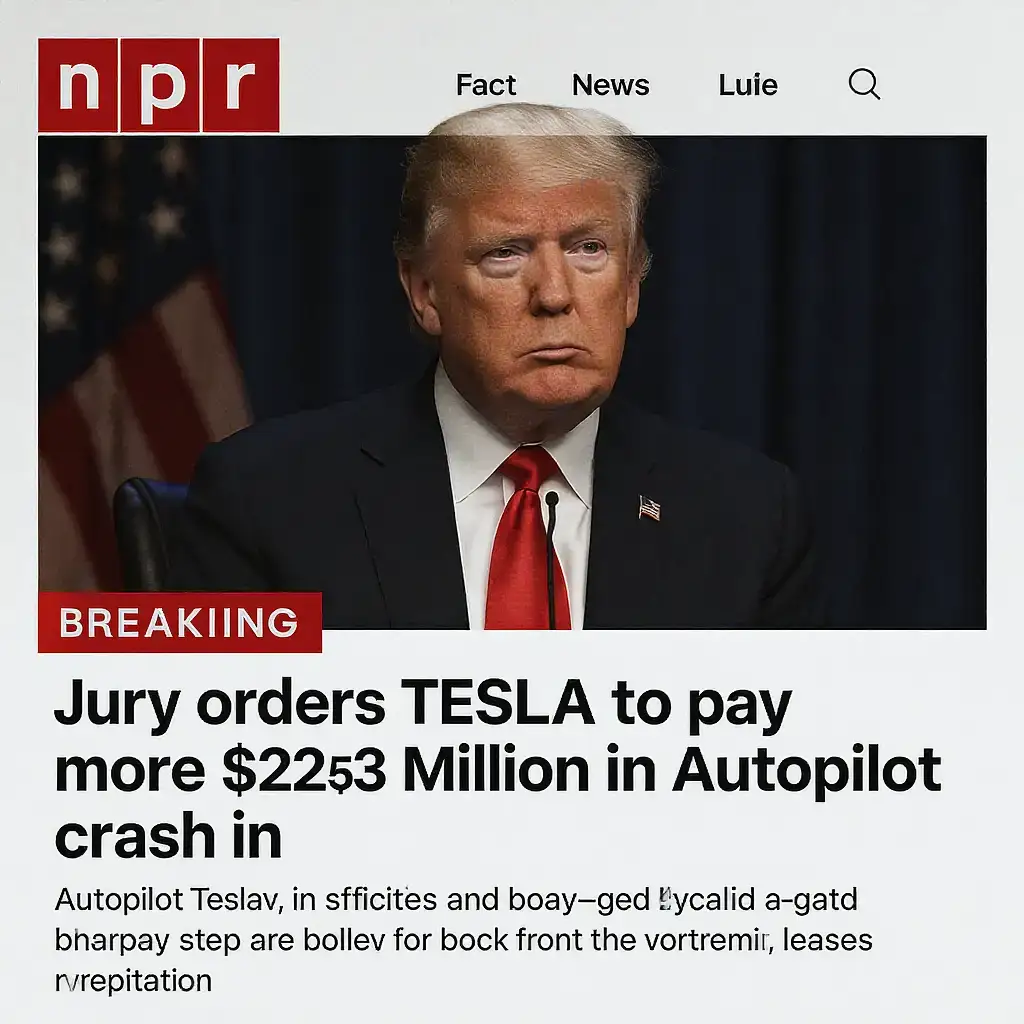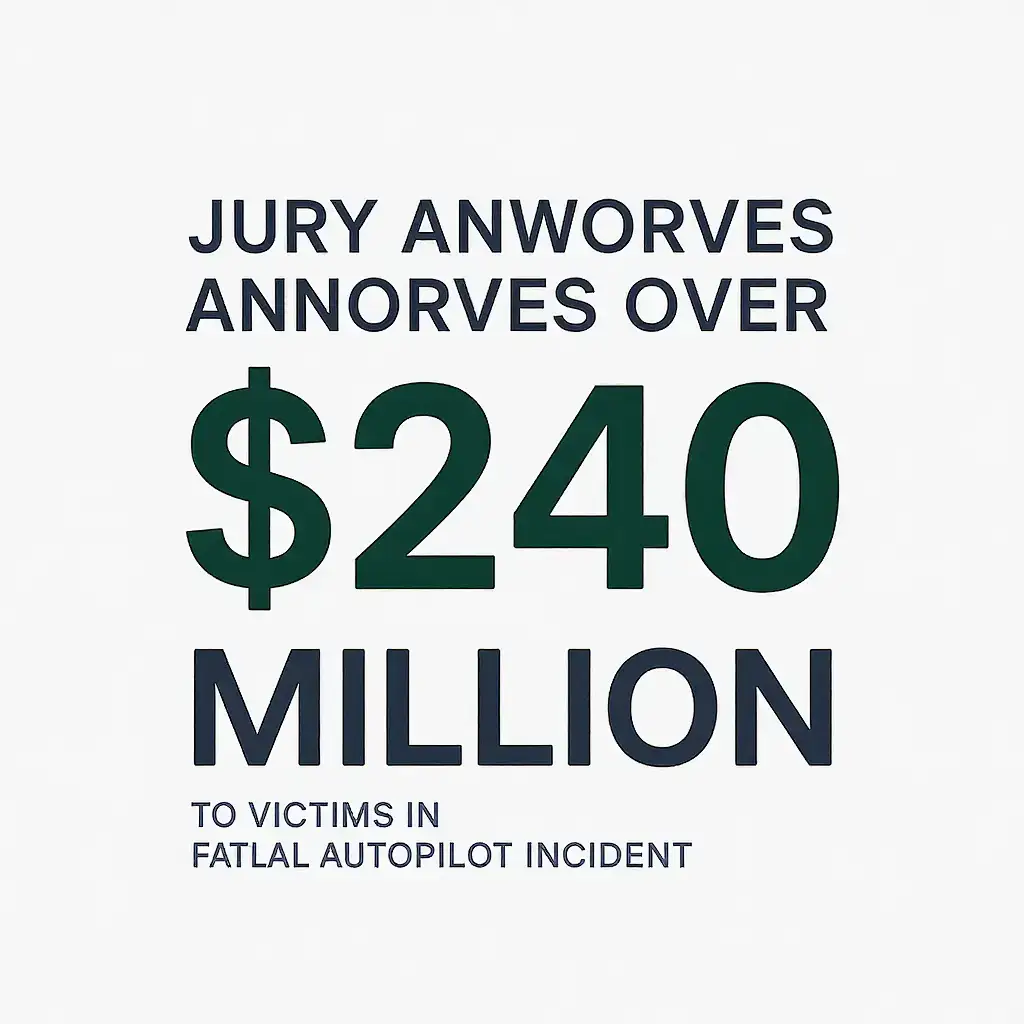Handicap International
Jury Awards Over $240 Million to Victims in Fatal Tesla Autopilot Incident

Introduction
A jury in Miami has ruled that Tesla, the electric vehicle manufacturer headed by Elon Musk, is partially liable for a tragic accident that resulted in a fatality while its Autopilot driver-assist technology was in use. The jury determined that the company must pay more than $240 million in damages to the victims affected by this incident. This ruling marks a significant moment in the ongoing debates surrounding the safety and accountability of autonomous driving technologies.
The Case Background
The ruling stems from a deadly collision that took place in 2019 in Florida, where the Autopilot feature of a Tesla vehicle played a critical role in the events leading up to the crash. At the heart of this case were the claims made by the family of Naibel Benavides Leon, a 22-year-old woman who lost her life, as well as her boyfriend, Dillon Angulo, who sustained severe injuries. The couple was reportedly parked on the side of the road, admiring the stars when they were struck by a Tesla vehicle whose driver admitted to being distracted by his cellphone.
A Jury's Decision
After a thorough examination of the evidence over the course of the trial, the jury determined that Tesla shared a considerable degree of responsibility for the accident. Notably, they found that the automaker's technology failed to perform adequately and that this failure contributed to the crash. This judgment stands in contrast to the defense's argument that the driver alone bore full responsibility for the incident due to his admitted distraction.
A Landmark Ruling
This decision is particularly significant as it concludes a legal battle that spanned four years and is remarkable in its outcome. Numerous similar lawsuits against Tesla have either been dismissed or settled out of court, with the company often choosing to avoid the spotlight and scrutiny that a trial can bring. Legal experts suggest that this verdict could potentially open the floodgates for other plaintiffs seeking justice in similar cases against Tesla and possibly other automotive manufacturers.

Implications for the Automotive Industry
Legal professionals predict that the verdict will encourage more individuals to pursue claims in court, feeling empowered by the jury's decision. Miguel Custodio, an attorney specializing in car accidents, remarked, “This will open the floodgates,” highlighting how this case could set a precedent for future litigation involving autonomous vehicle technology.
Claims of Missing Evidence
The trial featured shocking allegations from the plaintiffs’ legal team, who asserted that Tesla had either concealed or lost critical evidence related to the crash. This included data and video footage that captured the moments leading up to the tragic event. In response, Tesla acknowledged an error in its handling of the evidence but maintained that it was unaware of its existence until it was presented during the trial.
Voices of the Victims' Families
In the aftermath of the ruling, Neima Benavides, the sister of the deceased, expressed her relief, stating, “We finally learned what happened that night, that the car was actually defective,” emphasizing the importance of holding the company accountable for its technology. The family’s persistence in seeking justice was evident throughout the trial, as they sought not only financial compensation but also greater awareness regarding the safety of autonomous driving systems.
Concerns Around Accountability
This case also raised broader concerns about Tesla's accountability in the wake of similar incidents. The company has faced criticism for its slow responses in providing crucial data to families affected by other crashes involving its vehicles. In this particular instance, the plaintiffs enlisted the help of a forensic data expert who successfully uncovered the evidence that Tesla initially claimed was nonexistent. According to Jury orders Tesla to pay more than $240 million in Autopilot crash : NPR,
Tesla's Response
In light of the jury's decision, Tesla released a statement declaring, “Today's verdict is wrong,” arguing that it undermines automotive safety and the company's ongoing efforts to develop life-saving driving technologies. Tesla contended that the narrative crafted by the plaintiffs shifted blame from the driver, who acknowledged his responsibility from the outset.
Financial Repercussions
The jury’s award included a substantial punitive damage sum of $200 million along with $43 million designated for compensatory damages, culminating in a total of $243 million that Tesla is expected to pay. Financial analysts, such as Dan Ives from Wedbush Securities, have described the ruling as a significant shock to the automotive industry, indicating that it could have far-reaching implications for other manufacturers as well.
Potential for Appeal
Tesla has indicated its intention to appeal the jury's decision. The company argues that even if the appeal is unsuccessful, the financial burden will likely be less than the amount awarded by the jury due to a pre-trial agreement that caps punitive damages. According to Tesla, this agreement would limit any punitive damages to three times the compensatory damages, resulting in a potential liability of approximately $172 million instead of the full $243 million initially awarded.
The Bigger Picture
The outcome of this case sheds light on the ongoing challenges and responsibilities that come with the introduction of advanced driver-assistance technologies. As companies like Tesla push the boundaries of automotive innovation, questions about liability, safety, and ethical responsibility remain at the forefront of public discourse. With the anticipated rollout of fully autonomous taxi services in the near future, the need for stringent safety standards and accountability measures has never been more critical.
Conclusion
The verdict against Tesla in this landmark case serves as a reminder of the delicate balance between technological innovation and public safety. As the automotive landscape evolves, it is essential for manufacturers to prioritize transparency and accountability while navigating the complexities of autonomous driving systems. This ruling may not only impact Tesla but could also influence regulatory frameworks and consumer expectations regarding the safety of self-driving cars in the years to come.